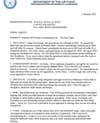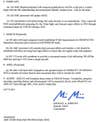‘Aim for the head’ — Air Force general warns of a war with China by 2025 in belligerent memo
“I hope I am wrong. My gut tells me we will fight in 2025."

A top U.S. Air Force general is not only preparing for the possibility of an armed conflict with China, but believes it will happen in the next two years.
“I hope I am wrong. My gut tells me we will fight in 2025,” Air Mobility Command (AMC) commander Gen. Mike Minihan wrote in a recently-released memo forward dated for Feb. 1, citing both the United States and Taiwanese presidential elections in 2024 as a source of geopolitical distraction that China might seize upon to launch a full-scale invasion of the island nation.
In his memo, Minihan writes that AMC built a solid foundation for readiness in 2022, but needs to go faster in the new year. As a result, the general expects to “drive readiness, integration, and agility for ourselves and the Joint Force to deter, and if required, defeat China” in the coming years.


How does Minihan expect commanders to accomplish this? Among other things, the memo ordered all AMC personnel with weapons qualifications to fire a full “clip” of ammunition into a 7-meter target in February “with the full understanding that unrepentant lethality matters most.”
“Aim for the head,” Minihan wrote.
Subscribe to Task & Purpose Today. Get the latest military news, entertainment, and gear in your inbox daily.
While the Defense Department has spent the last several years discussing “great power competition” and “near-peer adversaries” as euphemisms for China (and, until the botched invasion of Ukraine, Russia), Minihan’s memo represents an unusually bellicose departure from Pentagon talking points regarding the U.S. military’s strategic competitors around the world.
Indeed, Minihan’s memo is “not representative of the department’s view on China,” a Pentagon official told Task & Purpose.
“The National Defense Strategy makes clear that China is the pacing challenge for the Department of Defense and our focus remains on working alongside allies and partners to preserve a peaceful, free and open Indo-Pacific,” Pentagon spokesperson Gen. Pat Ryder said in a statement to Task & Purpose.
Minihan is no stranger to bold statements and claims, especially regarding future conflicts with China. In September, Minihan went on a bizarre and “untethered” rant at the Air & Space Forces Association’s Air Space & Cyber Conference warning that China poses an existential threat to the United States and that the U.S. military as of then was not ready for a fight in Pacific island chains against a Chinese government that was “tailor-making an air force to kill [the U.S. Air Force].”
Minihan also invoked Air Force officers such as Curtis LeMay, who infamously called for bombing Cuba during the Cuban Missile Crisis and oversaw the firebombing of civxilian sites in Japan during World War II.
“[W]hen you can kill your enemy, every part of your life is better. Your food tastes better. Your marriage is stronger,” Minihan said.
Minihan is not the only U.S. military leader who has raised the possibility of a near-future conflict with China over Taiwan. Chief of Naval Operations Adm. Mike Gilday stated in October that he could not rule out the possibility of China launching an invasion of the island in 2023.
Minihan’s memo is noteworthy given the vital role AMC plays in U.S. military logistics by overseeing transport and refueling planes, including the Air Force’s fleet of C-17 cargo planes and aircraft such as the KC-135 and KC-46.
Responding to the memo on Friday, retired U.S. Navy Adm. James Stavridis, former Supreme Allied Commander for the North Atlantic Treaty Organization, tweeted that the likelihood of a war with China is decreasing, not increasing.
Although Pentagon officials said Minihan’s views are not representative of the department’s, the U.S. military has been developing a strategy in the Pacific around China. The Marine Corps has been preparing for the possibility of an island-hopping campaign similar to World War II. Joint exercises with allies, such as the Rim of the Pacific or Garuda Shield, have not explicitly named China as the adversary they are training against, but are framed against a military threat equal to that superpower. Other drills have been close to Chinese territory as well.
Both President Joe Biden and Secretary of Defense Lloyd Austin have said that they welcome competition but are not looking for conflict. At a joint press conference with Japanese counterparts on Jan. 11, Austin told reporters that he does not think a Chinese invasion of Taiwan is imminent, despite recent activity in the Taiwan Strait.
Austin stressed the need for communication with Beijing.
“In that way, we can avoid miscalculation wherever possible. And you see us continuing to try to ensure that we keep those lines open, and I would invite my colleagues in China to meet us halfway there and work hard to keep those lines of communication open. And that is the primary and best way to avoid that miscalculation,” Austin said.
The latest on Task & Purpose
- The Navy wiped the ‘Top Gun: Maverick’ director’s camera after he ‘captured something I wasn’t supposed to capture’
- Marine under investigation after viral video showed altercation with hotel staff
- Fighter pilot to receive Navy Cross more than 70 years after classified dogfight with 7 Soviet jets
- 2 Navy commanders fired in one day
- The Marines have a new ship-killing weapons system to counter China
Want to write for Task & Purpose? Click here.
